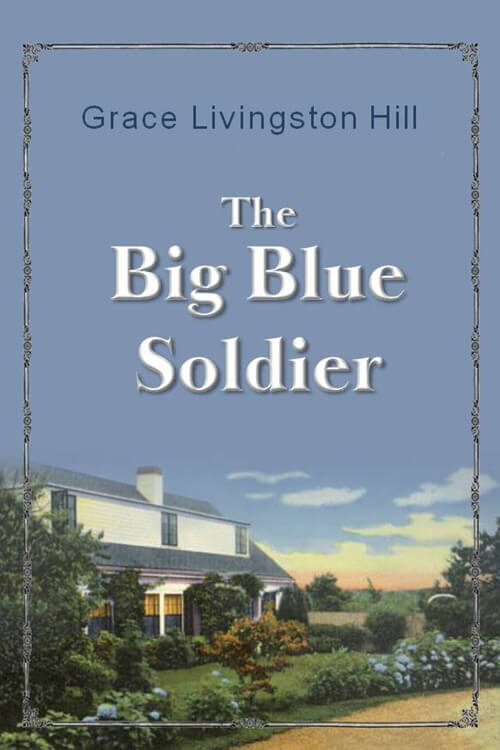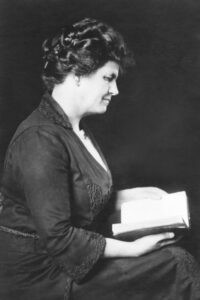
The Big Blue Soldier
For was not Dick among those favoured few who were to remain and do patrol work for an indefinite time in the land of the enemy while others were gathered in their waiting homes and eager loved ones? Miss Marilla spoke of Dick as one who still lingered on the borderland of terror and who laid his young life a continuous sacrifice for the good of the great world.
A neat paragraph to that effect appeared in The Springhaven Chronicle, a local sheet that offered scant news items and fat platitudes at an ever-increasing rate to an unsuspecting and conceited populace, who supported it because it was the only way to know what one’s neighbours were doing. The paragraph was the reluctant work of Mary Amber, the young girl who lived next door to Miss Marilla and had been her devoted friend since the age of four when Miss Marilla used to bake sugar cookies for her in the form of story men with currant eyes and outstretched arms.
Mary Amber remembered Nephew Dick as a young imp of nine who made a whole long, beautiful summer ugly with his torments. She also knew that the neighbours all around about had memories of that summer when Dick’s parents went on a Western trip and left him with his Aunt Marilla. Mary Amber shrank from exposing her dear friend to the criticisms of such of the readers of The Springhaven Chronicle as they had memories of their cats tortured, their chickens chased, their flower beds trampled, their children bullied, and their windows broken by the youthful Dick.
But time had softened the memories of that fateful summer in Miss Marilla’s mind, and, besides, she was sorely in need of a hero. Mary Amber had not the heart to refuse to write the paragraph, but she made it as conservative as the circumstances allowed.
But now, at last, among the latest to be sent back, Lieutenant Richard Chadwick’s division was coming home!
Miss Marilla read in the paper what day they would sail, and that they were expected to arrive not later than the twenty-ninth, and, as she read, she conceived a wild and daring plan. Why should she not have a real, live hero herself? A bit belated, of course, but all the more distinguished for that. And why should not Mary Amber have a whole devoted soldier boy of her own for the village to see and admire? Not that she told Mary Amber that, oh, no! But in her mind’s vision, she saw herself, Mary Amber, and Dick all going together to church on Sunday morning, the bars on his uniform gleaming like the light in Mary Amber’s hazel eyes.
Read or download Book
Grace Livingston Hill
Grace Livingston Hill was born in Wellsville, New York, to Marcia Macdonald Livingston and her husband, Presbyterian minister Rev. Charles Montgomery Livingston.
Biography.
Both were writers, as was her aunt, Isabella Macdonald Alden, who wrote under the pseudonym “Pansy.” Hill’s writing career began as a child in the 1870s, writing short stories for her aunt’s weekly children’s publication, The Pansy. Her first story printed in book form was The Esselstynes, which was published in 1877 as part of the “Mother’s Boys and Girls Library” by D. Lothrop & Company. A Chautauqua Idyl, her first book as a young adult, was written in 1887 to earn enough money for a family trip from her Florida home to the summer Chautauqua gathering at Chautauqua, New York. This illustrated allegory of a Chautauqua gathering held by the flowers, trees, and animals was published in time to be offered for sale that summer and brought enough earnings to take the family there. Several books written in collaboration with her family followed in the early 1890s, as well as her only children’s book, A Little Servant.
Lack of funds was a frequent motivator, particularly after the death of her first husband left her with two small children and no income other than that from her writing. After the death of Hill’s father, less than a year later, her mother came to live with her. This prompted Hill to write more frequently. She continued to write to support her children and mother during and after her failed ten-year marriage to her second husband, Flavius Josephus Lutz, a church organist 15 years her junior. She stopped using the Lutz surname after they parted ways in May 1914. Although many of her earlier novels were explicitly intended to proselytize, Hill’s publishers frequently removed overt references to religious themes. After her publishers realized the popularity of her books, references to religious topics were allowed to remain. However, she later modified her writing style to appeal to a more secular audience. The last Grace Livingston Hill book, Mary Arden, was finished by her daughter, Ruth Hill Munce, writing under the name of Ruth Livingston Hill, and published in 1948.






